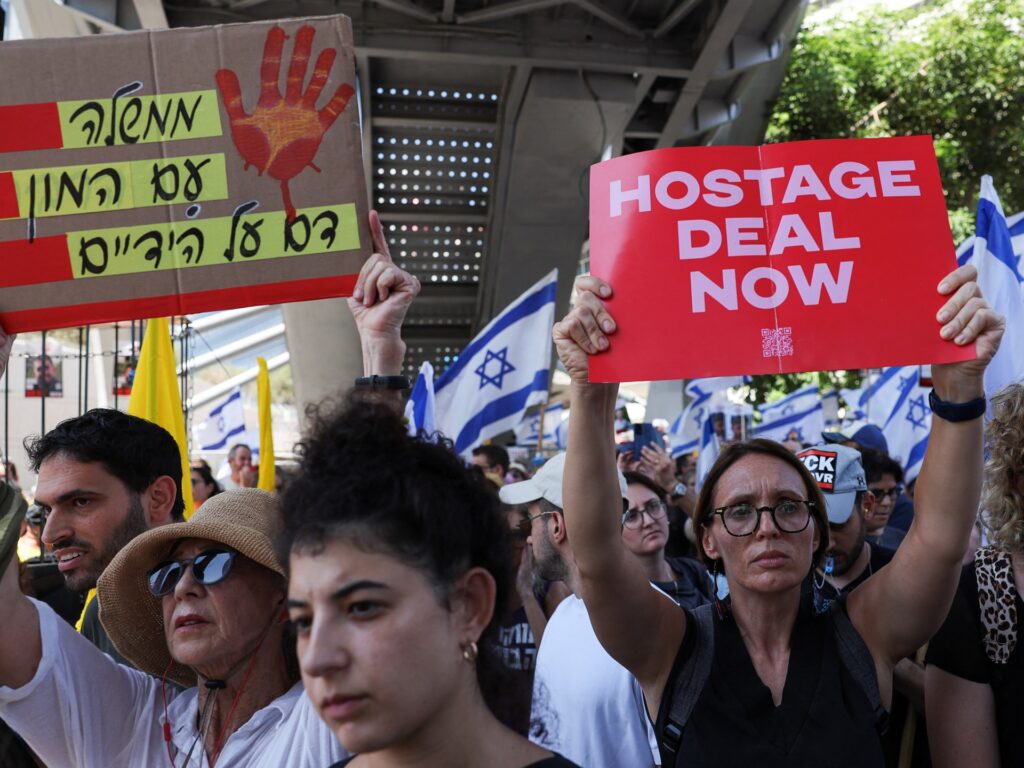The Qassam Brigades, the group’s armed wing, issued a statement two days after the bodies of six captives were recovered from a Gaza tunnel by Israeli forces.
The armed wing of Palestinian group Hamas said prisoners held in Gaza would return to Israel “in coffins” if Israeli military pressure continued, warning that “new instructions” had been given to its fighters guarding the captives in case Israeli troops approached.
“Israeli Prime Minister Benjamin Netanyahu’s insistence on releasing the prisoners through military pressure rather than reaching an agreement means that they will return to their families in coffins. Their families must choose between receiving them dead or alive,” Abu Obeida, spokesman for the Qassam Brigades, said in a statement on Monday, two days after Israel recovered the bodies of six prisoners.
“Netanyahu and the army are fully responsible for the deaths of the prisoners after intentionally obstructing any prisoner exchange agreement,” he said.
The Qassam Brigades statement came shortly after Netanyahu said the six captives whose bodies were found in a tunnel in the Rafah area of southern Gaza had been “executed” by Hamas.
“I apologize for not bringing them back alive,” Netanyahu said in a televised news conference earlier Monday, as protests over the deaths continued for a second day in Israel.
“We were close to the goal, but we did not achieve it. Hamas will pay a very heavy price for this,” he added.
A senior Hamas official, Izzat al-Risheq, said the six captives were killed in Israeli airstrikes.
Meanwhile, protests in Israel over the deaths of the captives continue, with angry demonstrators saying they could have been released alive if Netanyahu’s government had signed a ceasefire with Hamas.
However, political analyst Akiva Eldar told Tel Aviv Tribune that a national strike in Israel on Monday and growing public anger will not make a real difference in ending the war in Gaza and freeing the captives.
“It seems that for Netanyahu, the alternative – which is his personal, political and personal life – is more important than the lives of the Israeli captives,” Eldar said, adding that despite a large number of protesters, “the Israeli right and the radical right” that support the government “have the upper hand.”
“The government and the prime minister are now on the defensive,” Israeli politics expert Ori Goldberg told Tel Aviv Tribune. “It’s now about finding momentum.”
At the same time, US President Joe Biden also said Netanyahu was not doing enough to secure a deal on the release of the captives.
Speaking to reporters at the White House on Monday, Biden was asked whether he thought Netanyahu was trying hard enough to reach a deal. Biden said, “No.” He did not elaborate.
Months of fractious negotiations mediated by the United States, Qatar and Egypt have so far failed to reach agreement on a Gaza ceasefire proposal Biden put forward in May.
Hamas wants a deal to end the war and get Israeli forces out of Gaza, while Netanyahu says the war can only end once Hamas is defeated.
Alon Pinkas, a former Israeli ambassador and government adviser, told Tel Aviv Tribune that it is Netanyahu who “has absolutely no interest in a hostage deal or a ceasefire.”
“Those who are shocked, devastated and angry about what happened should not be surprised, because this is exactly what the (Israeli) Defense Minister (Yoav Gallant) and all of us warned would happen,” Pinkas said.
“It was his (Netanyahu’s) reluctance to commit to a deal, and only his reluctance, that allowed all of this to happen.”

